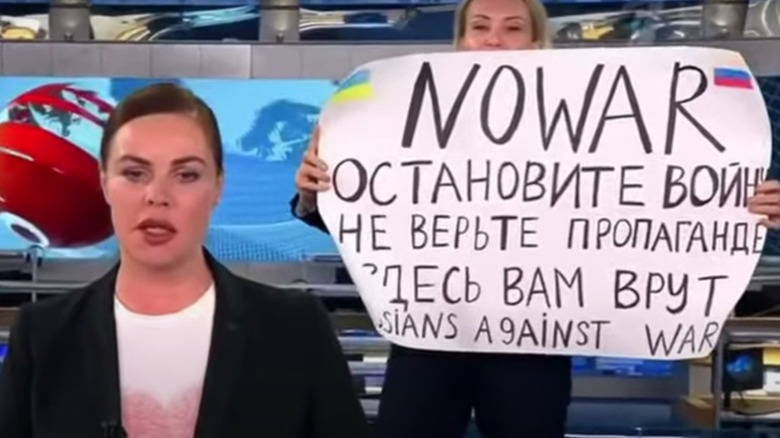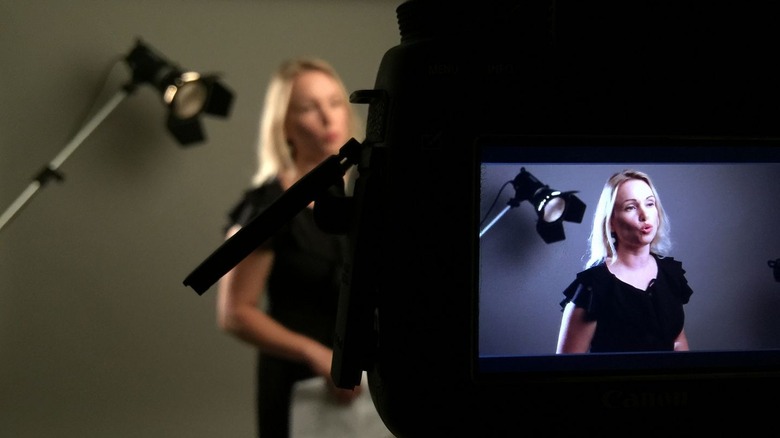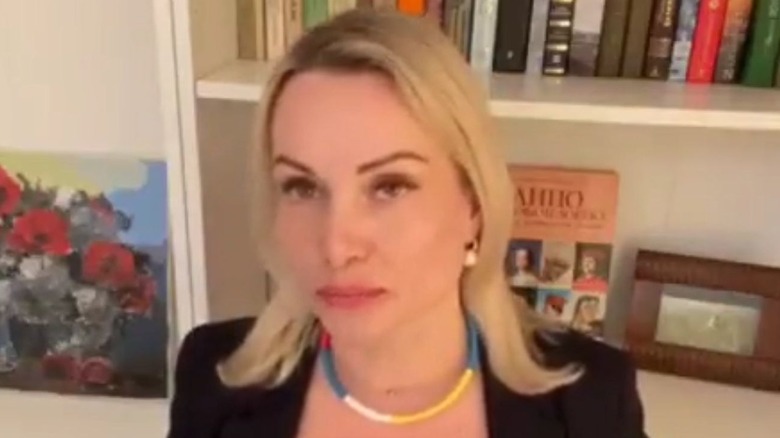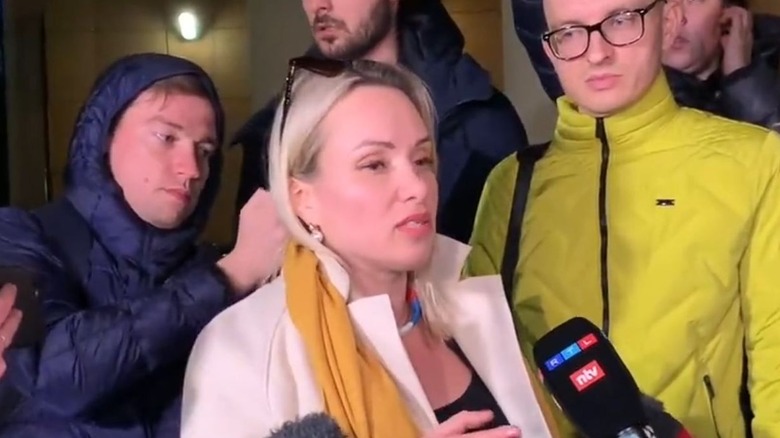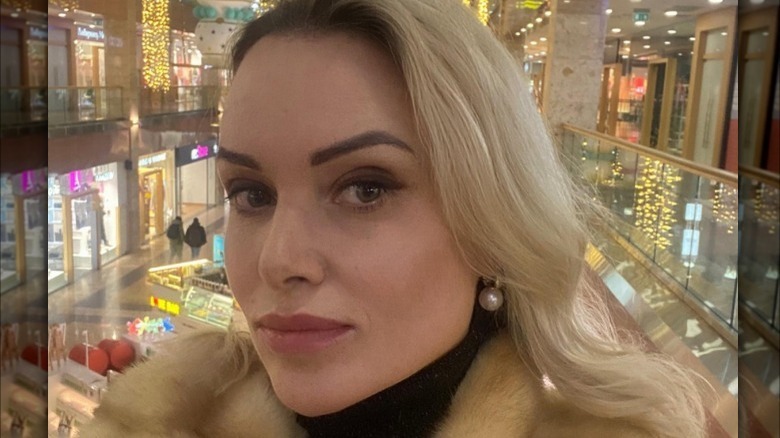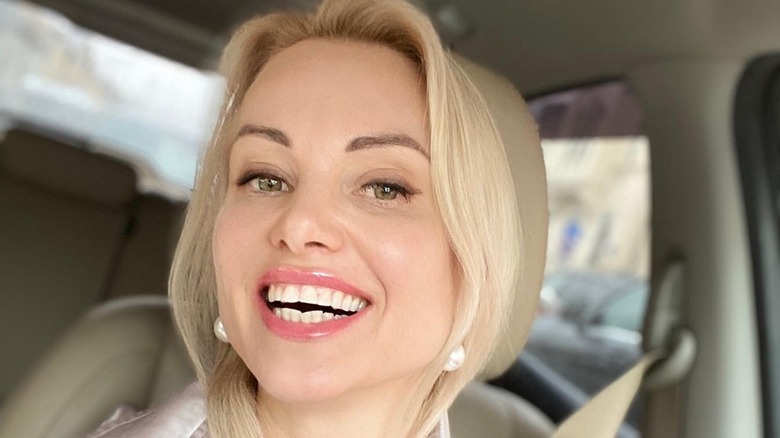Everything We Know About Russian Protester Marina Ovsyannikova
For the past three weeks the world has watched in horror as war has been unleashed by Vladimir Putin against the people of Ukraine. According to Al Jazeera, thousands of Ukrainian civilians have been killed or injured, and both sides of the conflict have sustained thousands of casualties among their soldiers.
Although there are pockets of support for Putin's ambitions, most of the world is united in its opposition to the unjustified invasion. Protests have taken place across the world from Amsterdam to Washington, D.C., and on every continent except Antarctica (via Al Jazeera).
Protests are even taking place in Russia, which has been notorious for state control of the media for over 100 years. The BBC reports that since the resurgence of the conflict in February, nearly 15,000 Russians have been detained for protesting the war.
One protester in particular, Marina Ovsyannikova, has received more attention than most for interrupting the broadcast of an evening news program holding an anti-war poster. She was promptly arrested and held incommunicado by Russian authorities.
Primetime protest
The protest occurred during the evening news. On screen was veteran anchor Ekaterina Andreeva who was reading a report on how to mitigate the effects of international sanctions on the Russian economy. Ovsyannikova entered the set with a sign in both English and Russian. In English it said "No war" and "Russians against war." In Russian it said "Stop the war. Don't believe the propaganda. They're lying to you."
As her message was being broadcast to millions of Russians, Ovsyannikova chanted "Stop the war. No to war" until the TV station cut away to another report. She was promptly detained by Russian police after the incident (via The New York Times).
Ovsyannikova was an employee of the state-owned television station Channel One, on whose airwaves the protest occurred. Channel One is Russia's largest broadcaster and has a worldwide audience of 250 million. Vremya is one of the most popular shows on Russian television and is watched by millions of people every night.
Pre-recorded statement
Shortly after Ovsyannikova's protest, Russia-based human rights group OVD-Info released a pre-recorded video statement she had made. According to a translation of the video released by the Telegraph, Ovsyannikova says she works for Channel One doing Kremlin propaganda and that she's very ashamed of it.
In the video she is wearing a necklace with the colors of the Russian and Ukrainian flags and says that her father is Ukrainian and her mother is Russian. She calls the war "fratricidal" and calls on Vladimir Putin by name to end his aggression in the criminal invasion of Ukraine.
She says she is ashamed of the part she played in distributing propaganda and contributing to the "zombification" of the Russian people. She calls out media complacency in the 2014 annexation of Crimea and the 2020 poisoning of Alexei Navalny.
She finishes her statement by calling on the Russian people to protest. She says only the Russian people can stop "this madness."
Lost and found
Following her detention on Monday, nobody was able to find her. OVD-Info said that she was being held at a police station in Moscow but none of her lawyers were able to confirm if she was being held there (via Newsweek).
There were fears that because she was being held without access to representation, that she would be facing a harsher punishment. A new Russian law that prohibits spreading fake news and discrediting the military carries a penalty of up to 15 years (via Newsweek).
But on March 15, the BBC reported that she has been fined $280 and released. She told reporters that she hadn't slept in two days and that she had been questioned for 14 hours. Unfortunately it's not known if she faces more charges in the future. The fine she received is directly related to her video statement made before her interruption of the news broadcast, so she remains in legal jeopardy. Although she's been released from custody, Ovsyannikova likely still has a long road ahead of her.
Who is Marina Ovsyannikova?
There's not much to glean from Ovsyannikova's personal life online. The bio on her private Instagram account says she enjoys golden retrievers, open-water swimming, and being a mother. According to her Facebook bio she's swam across both the Volga River and the Bosporus Strait. She likes travel, running, and working out. She's a divorcée and the mother of two children. One Russian site claims she was born in Odessa, Ukraine (via TASS).
She attended university at Kuban State University in Krasnodar, 100 miles north of Sochi on the Black Sea. In 2005 she attended the Russian Presidential Academy of National Economy and Public Administration, an institution founded by Vladimir Putin in 2010 and which prides itself on training Russia's future political elite (via RANEPA).
One of her fellow alumni who studied journalism in Krasnodar is Margarita Simonyan, the editor-in-chief of RT, Russia's state-controlled English-language news channel. Ovsyannikova's ex-husband is also apparently a director for RT (via Novye Izvestia).
What's next?
Although Marina Ovsyannikova has been released from custody, she likely still has a challenging time ahead of her. The fines she has paid were related to the video she released but her on-air actions could mean she could face even more charges, including, potentially, up to 15 years in a penal camp (via Newsweek).
Thankfully for her, her lawyer is Anton Gashinsky. Gashinsky was the Belarussian lawyer who was responsible for freeing Vitali Shkliarov, a U.S. citizen who was detained in Belarus for three months. Shkliarov, who had previously worked for the Obama administration, was detained for working with the opposition to Belarussian president Alexander Lukashenko (via BuzzFeed News).
In addition to high-powered lawyers, Ovsyannikova also has two national leaders on her side. Ukrainian president Volodymyr Zelenskyy thanked her for her courage and France's president Emmanuel Macron has said he is looking into offering her protection either at the French embassy or asylum in France itself (via BBC).
